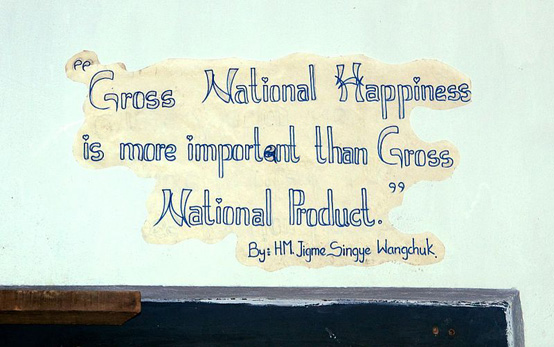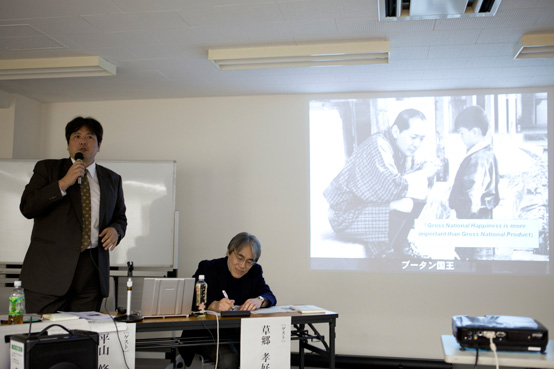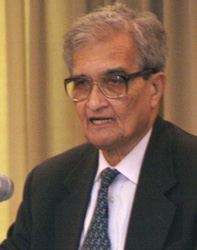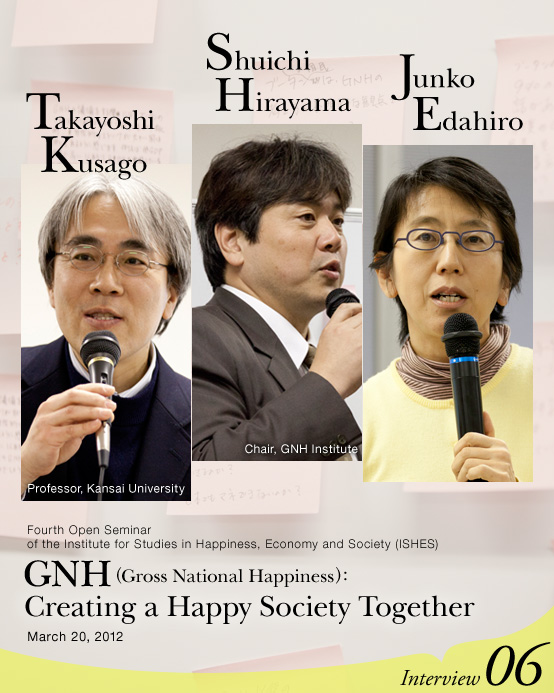- Edahiro :
- I would like to begin by introducing some key issues as I see them, and then ask you both for comments.
- Regarding the issues of Gross National Happiness [indicators] and “happiness,” today I would like to discuss approaches to deal with these “new indicators.” Japan is especially undergoing dramatic changes. In ages past, men in particular were embarrassed to even talk about happiness, and many felt it was a topic only for women. But things have changed. I think the reason for this is that everyone now realizes that we can no longer avoid thinking about topics like GNH and happiness.
- This has become clear on at least two dimensions. The first is the global environment. We are already exceeding the planetary limits. And despite this, we are still trying to expand our economies through GDP growth. We realize that at this point, if we look at the Earth -- global warming, biodiversity issues, and so on -- we know that this is impossible. Because of this truth, as we now see more clearly the limits of the Earth, there is a move in society to search for ways that take a different approach, ones that do not focus on just the size of the economy.
- Another dimension, if we speak of the extreme, is the collapse of society. Issues of a polarized society, disparities, the working poor, and people living in poverty. The fact that poverty is dramatically increasing in Japan is a backdrop to all of this.
- Meanwhile, when I bring up these kinds of things at lectures and so on, in almost every case, the response is, “Ideally, that would be good thing.” But people often then say, “Then what will become of Japan’s economy? Is it okay if the world leaves us behind? We will lose employment for our youth. The foundations of our pension system will collapse.”
- My general impression is that most people think that GNH and an emphasis on happiness would be a good thing, idealistically speaking, but that this is not being realistic.
- In other words, there is a huge divide between GDP and GNH, and it's my sense that the real issue is the absence of any bridge between the two. I sense that that is the biggest issue right now: How can we build a bridge between GDP and GNH?

- Edahiro :
- The first thing I would like to ask you both is how you see economic growth and GDP in Bhutan or in communities that are using GNH indicators. I would like to hear your comments, in terms of countries or a variety of concepts, on GDP and GNH, or on economy and happiness.
- Hirayama :
- Shall I begin? In effect, economic growth cannot be isolated from other things, and a certain level of income must be guaranteed.
- However, that money should not come from the kind of economic growth that just creates more money, but something that does not fail to consider investment in the land, investment in the environment, and investment in future generations -- the kind of thing that creates the fertile ground needed for re-production that can properly support a sustainable economy. If economic development to that end is not possible, then the burdens should be shared and all should receive the full benefits of the shared burden. As in the case of Kora Town in Shiga Prefecture, some communities are working to operate based on these concepts.
- This is why we cannot condemn or eliminate economic development. We still want to consider it. Nevertheless, for economic development, GNH is also being considered as a yardstick we have chosen that doesn't contradict other things that are also important to protect.

- Kusago :
- I may not have an adequate understanding of the situation in Bhutan, but I don't think they reject GDP [as an indicator]. People who are in a position to make decisions, for example, may want to increase employment in the information and technology sector, or they may champion the need for domestic employment.
- But that alone will not take care of everyone, and these ideas do not aim to satisfy 100 percent of the people by creating livelihoods with high wages for everyone in so-called urban industries. In my opinion, I actually think that Japan is weak when it comes to a sense of balance in those areas.
-

Amartya Sen (1993-). Indian economist and the fist Asian Nobel Laureate in Economics.
Something I really like about economist Amartya Sen is that he goes as far as saying that living conditions that satisfy people cannot be measured by material wealth alone, and he also refers to the issue of “equalizing.”
He says that economic theory forms the foundations of society in which we live today, and with that theory, we have a certain number of things that we all want to have in order to live the way we want to live, and looking at that, it would be wonderful if everyone could share.
-
For example, if you could live a wonderful life on an annual income of 3 million yen, that would mean allocating 3 million yen to everyone. But with 3 million yen, is the situation the same for everyone? For example, it is clear that if a certain person needs dialysis, for that person 3 million yen is not the same as for someone who does not need it. The economic theory that measures things without taking this sort of thing into account has, in fact, been used to design our society.
- Sen criticizes this. He says that we should not use the same approach as the one used by economics, which looks at society overall in terms of averages, but that the situation of each individual should be properly respected, in order to create a society that has a high quality of life for all that also makes it easy to manifest each person’s abilities. He asks what economics can offer to accomplish those ends. And the answer he proposes is the concept he refers to as “capability.”
- Because of that, I speak about the GNH approach from the perspective I mentioned earlier: the idea that we have to change economic theory itself.
- As for how this could be achieved, I think the answer is to discuss this from the perspective of what kind of society you want to design. In other words, “If you have that kind of blueprint, about how much income is needed in order to satisfy that blueprint?”
- I personally think that we can gain some hints from examples in Bhutan, where we find an interesting dimension of GNH.
- So this is how I would put it: Making use of the GNH concept, and Sen's thinking, let's decide properly on our priorities, with things that are easy for us to do, about what we all think is important. After these are decided, then the important thing is to allocate the precious and limited wealth. I think that this is one step towards realizing a GNH approach.








